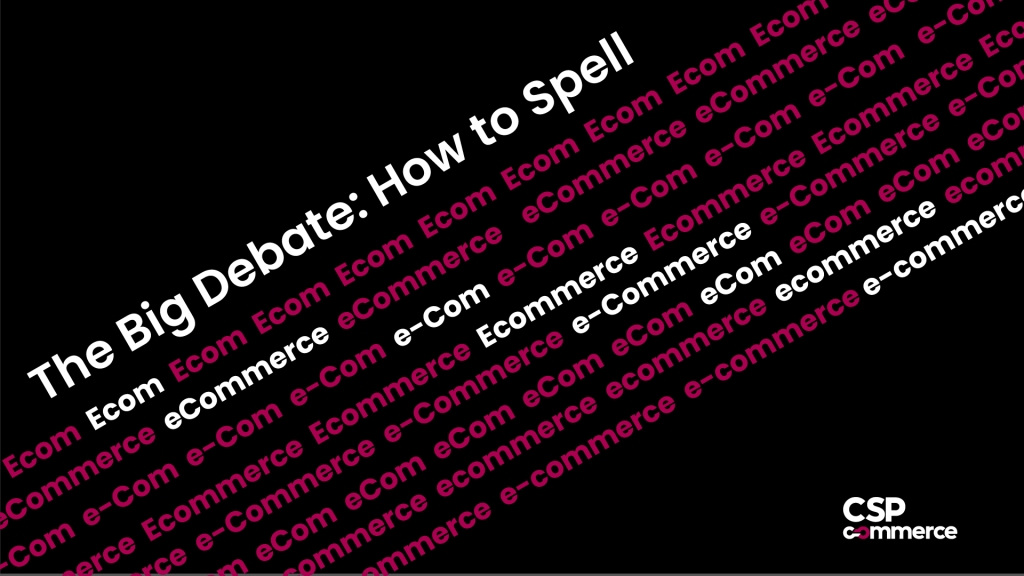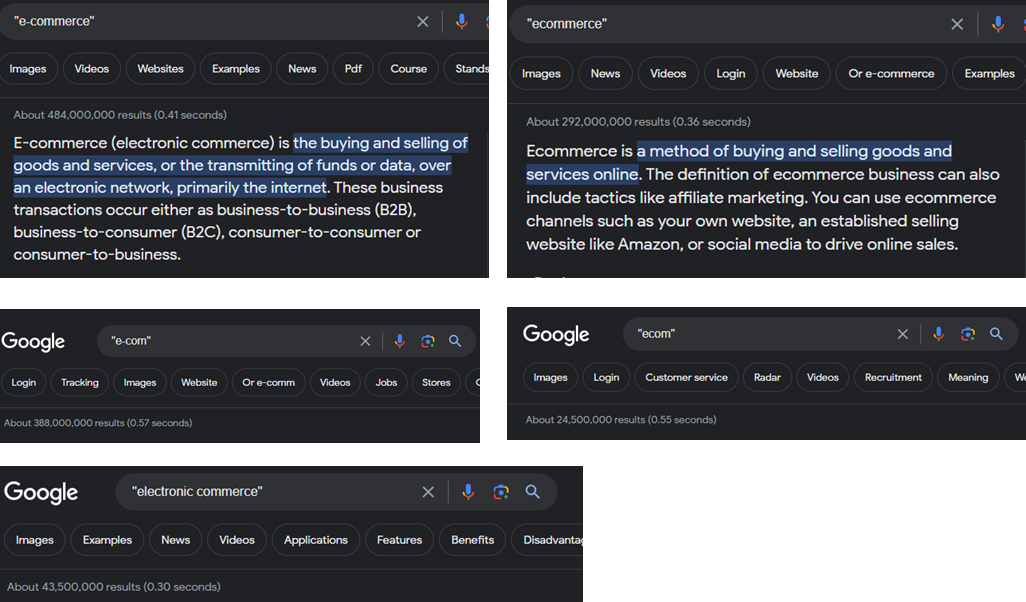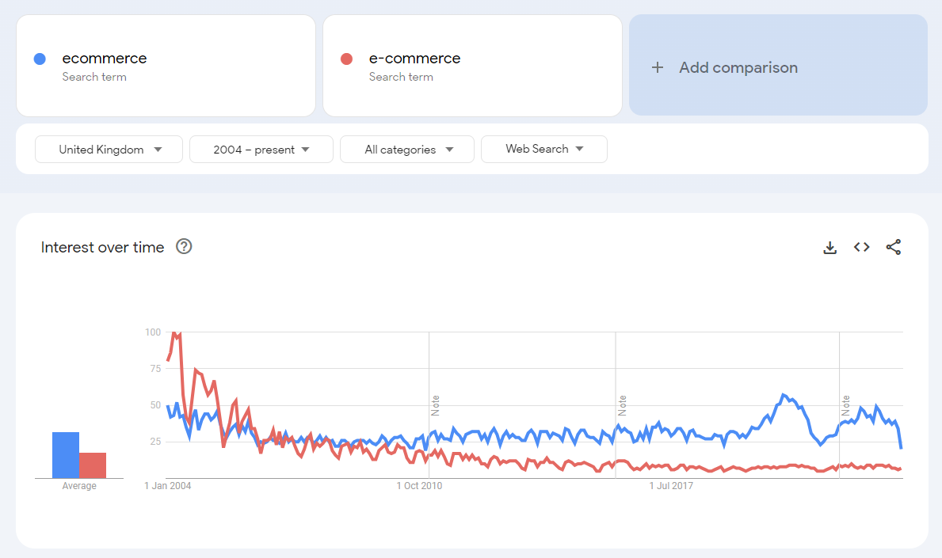September 8, 2023
The Big Debate: Is it Ecommerce, e-commerce, eCommerce or ecommerce?

Online retailers, marketing agencies, retailers, marketplaces, couriers and website platforms are all caught in a significant ongoing debate. What is the correct spelling of ecommerce/eCommerce/e-commerce?
As we wish to hold the answer in suspense there is a variety of spelling for eCommerce throughout the article.
As the English language, its grammar and colloquialisms evolve so does our use of particular words. The use of e-commerce is no different. The correct spelling is an ongoing debate which is constantly resurfacing on social media channels, forums and marketing meetings. To help you arrive at the right answer, we provide an overview of the emergence and evolution of the term. We also delve into the data to provide an indication of how it is being used and what the trends suggest it will move towards in the future.
In the following article we cover:
- Commerce and Electronic Commerce
- The History of Electronic Commerce
- Types of Ecommerce / eCommerce / e-Commerce
- Confusion caused by key stakeholders
- Thirteen Variations, One Meaning
- The Volume of Results on Google
- The Changing Tides: Insights From Google Trends
- Search Behaviour With Insight From SEM Rush
- **ommerce is the past, **mmerce is the present, but **ommerce is the future
Commerce and Electronic Commerce
Commerce is a broad term that encompasses all types of commercial activities involving the exchange of products and services for money. Commerce can include traditional retail with bricks and mortar, wholesale and both online and offline. It is a generic term that doesn’t specify the channel or medium used for transactions. Electronic commerce emerged as a subset of commerce, but to understand its origin we must throw it back to the swinging 1960s.
The History of Electronic Commerce
It was a time when the Beatles ruled the airwaves, and local Bakeries and Butchers were still in fashion. A time when people would visit high street shops to buy their products! It was during this time that electronic data interchanges (EDI) were introduced. Prior to the Internet, EDIs enabled instant long-distance communication along shipment and supply chains. Originally developed for US Army, it would begin to be used by businesses to business companies, taking a further thirty years to be used by the general consumer.
The nineties capitalised on the growing capabilities of the World Wide Web, technology developed by the likes of Michael Aldrich and business models such as Charles M. Stack’s online bookstore. The decade also included the arrival of marketplaces in 1995 marking the arrival of Amazon and eBay. Marketplaces made it easier for online businesses and individuals to buy and sell products online from the comfort of their own homes. As these marketplaces gained prominence and consumers became increasingly tech-savvy, the dot-com bubble began to expand. Numerous commerce start-ups surged in valuation. That was until the bubble burst.
As the millennium broke, it underwent a transformation in its technology and the dot com bubble eventually recovered. Spurred on by the development, popularity and accessibility of new tech, including mobile phones, Personal Digital Assistants (remember those?), and Personal Computers (later known as Laptops), online sales became even more accessible to consumers. This accessibility ushered in improved user experiences and marked the maturation of the market. In parallel, a shift towards multichannel marketing emerged, blurring the lines between physical and online marketing and sales efforts.
Fast forward another twenty years, and we are now exposed to commerce across every digital touch point. Often integrated digital and physical campaigns provide an omnichannel experience that spans from end-to-end for the consumer.
Types of ecommerce / e-commerce / eCommerce
Today, under the vast e-commerce umbrella, there are three distinct categories:
- Business-to-business eCommerce: wholesale, regulated industries and dropshipping suppliers.
- Business To Consumer eCommerce: marketplaces, Shopify and WooCommerce websites.
- Consumer To Consumer eCommerce: Facebook marketplace, and marketplaces that promote individual reselling of items such as Vinted and Depop.
Confusion caused by key stakeholders of ecommerce / eCommerce / e-commerce
When we examine the preferences of influential players in the e-commerce landscape, we find a notable inclination towards ‘ecommerce’ among marketplaces like Amazon, eBay, and Etsy. However, leading marketing and eCommerce agencies like WPP, Wunderman Thompson Commerce and Dentsu all opt for ‘eCommerce’. On the flip side, ecommerce website platforms such as Shopify and WooCommerce opt for lowercase ‘ecommerce’, whereas Magento still opts for ‘eCommerce’.…So the answer is still ambiguous.
Thirteen variations with one meaning
Regardless of its spelling, the meaning of ecommerce remains widely agreed upon, as defined by three major UK dictionaries. For example:
The Oxford Dictionary defines it as: ‘Commercial transactions conducted electronically on the Internet.’
The Cambridge Dictionary defines it as: ‘The buying and selling of goods and services over the internet.’
The Collins Dictionary defines it as: ‘E-commerce is the buying, selling, and ordering of goods and services using the Internet.’
Now, let’s address the heart of the matter—the spelling conundrum. We’ve encountered a whopping thirteen variations of the term for ‘Ecommerce,’ its original unabbreviated version and one variant that has yet to grace our linguistic shores. The crux of the debate revolves around several key factors: the contraction, the abbreviation, the capitalisation, and the hyphen. But first, let’s share all of the spelling variations we’ve encountered on this rollercoaster ride:
- Electronic Commerce
- eCom
- Ecom
- E-com
- E-Com
- Ecomm
- e-commerce
- Ecommerce
- eCommerce
- ecommerce
- E-Commerce
- e-Commerce
- ECommerce
1) The contraction (from electronic commerce to ecommerce)
Ecommerce in itself is a contraction of two words: ‘electronic’ and ‘commerce’. A contraction is when a word has been abbreviated but has its own distinctive pronunciation. So eCommerce is the contracted version of the two words.
2) The abbreviation (from eCommerce to eCom)
An abbreviation is a method used to write a word or a phrase that can also be written out in full. Abbreviating a word often involves omitting one or more syllables from a word. This is also referred to as clipping. Abbreviated versions of words are rarely used in formal writing. However, in mediums such as social media and event promotions, which are often trying to communicate their message in as few characters as possible, it may be fitting to use an abbreviated version – so the use of ‘eCom’, ‘ecom’ or ‘e-Com’ is suitable in these cases.
3) Capitalisation (from ecommerce to Ecommerce and eCommerce)
The capitalisation game can also be a deciding factor in the spelling of eCommerce-related terms. Some opt for a capital ‘E’ to emphasize the electronic nature of the sales channel whilst others wish to capitalise the ‘C’ as it represents the commerce aspect. Depending on if you consider this ecommerce to be an abbreviation or contraction will likely influence your outlook on which letters, if at all, should be capitalised.
4) The hyphen (from eCommerce to e-Commerce)
The inclusion or omission of the hyphen in e-commerce can subtly alter the look and feel of the term. Some believe the hyphen adds clarity and structure, while others see it as an unnecessary impediment. When discussing its inclusion many draw comparisons to ‘email’ and ‘e-mail’. Stating that if the term is generic, it does not need the hyphen to be included.
The volume of results on Google
To shed further light on this debate, we turned to the quantitative data available on Google. A search revealed that ‘e-commerce’ produced 484 million results, while ‘ecommerce’ yielded 292 million results. Additionally, ‘e-com’ garnered 338 million results, surpassing ‘ecom,’ which only produced 24.5 million results. Notably, ‘electronic commerce’ generated 43.5 million results.

In terms of existing search results, the following rankings hold true:
- E-commerce
- Ecommerce
- Electronic commerce
- E-com
- Ecom
So if E-commerce is the most used it must therefore be right… unfortunately not!
The changing tides: Insights from Google Trends
A deeper dive into Google Trends reveals intriguing shifts in search habits. Since 2004, ‘e-commerce’ has witnessed a gradual decline in usage, while ‘ecommerce’ has shown consistent growth.

ecommerce rises whilst e-commerce declines
This trend is even more prominent when overlapping the two graphs.

Global analysis of search behaviour for E-commerce / Ecommerce spelling
When we analyse monthly searches around the world, using SEMRush, the trend indicates that ‘ecommerce’ (467k) is more prominently against ‘e-commerce (248k). Looking specifically at the UK, our country has settled on the spelling of ‘ecommerce’ (12k) vs ‘e-commerce’ (5k). The USA also follows a similar trend, with ‘ecommerce’ (74k) vs ‘e-commerce (27k).
British / UK Spelling of Ecommerce vs E-commerce

American / USA Spelling of Ecommerce vs E-commerce

E-commerce is the past, eCommerce is the present, but ecommerce is the future
In summary, the heart of the debate centres on thirteen spelling variations, influenced by factors such as contraction, abbreviation, capitalisation, and the hyphen. Major dictionaries align on the term’s definition, emphasizing its core concept: electronic commercial transactions conducted over the Internet. While quantitative data from Google search results places “e-commerce” at the top, our article underscores a shifting preference toward “ecommerce. Notably, Google Trends data confirms this trend towards “ecommerce” over “e-commerce.” As language continually evolves alongside technology, so does our approach to spelling and understanding digital commerce. In the end, the focus should not be solely on how you spell it, but rather on how effectively you harness its potential to propel your business forward.
So in the words of Shakespeare:
“What’s in a name? That which we call a rose by any other name would smell just as sweet.”
Or for a more definitive answer and in the words of this article’s author:
“E-commerce is the past, eCommerce is the present, but ecommerce is the future”
Join us in person for ‘Ecomm North’ in Manchester
The new must-attend free event series for the Northern eCommerce community. Hosted by SocialNorth in partnership with VML X Shopify.
ECOMM NORTH is the new multi-event series for Northern eCommerce. Hosted by SocialNorth in partnership with two giants of the eCommerce world: VML x Shopify.
For leaders and managers looking to navigate the dynamic, agile and ever-evolving world of eCommerce, staying up to date with trends and innovations is a constant challenge.
Join us at the brand new WPP Manchester Campus as we bring together the leading minds in eCommerce to explore the emerging challenges and opportunities that shape the sector, our businesses and brands.
From the latest campaigns to research and innovation, our industry-leading speakers will share their knowledge, expertise and insights on how they approach strategy, technology, and emerging opportunities to help grow some of the world’s biggest brands.
When: Thur 14 March 2024 (also 16 May, 11 July & 19 September 2024)
Where: WPP Manchester Campus, New Quay Street, Manchester
Time: 18:00-21:30
Price: ECOMM NORTH is a FREE EVENT (tickets limited to max 100)

